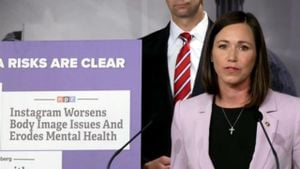In recent years, the landscape of educational materials in Missouri has drastically shifted, particularly following the enactment of a controversial law aimed at banning sexually explicit content in schools. The legislation has sparked a firestorm of debate among educators, librarians, parents, and students, raising concerns about censorship and the impact on access to diverse literature.
This new law, officially known as Senate Bill 775, went into effect in late August 2022, defining ‘explicit sexual material’ in such a way that its interpretation has resulted in surprising consequences for the reading materials available in school libraries. Critics of SB 775 argue that its ambiguous definitions could lead to the arbitrary removal of critical works, particularly those discussing LGBTQ+ themes and perspectives of people of color.
At the heart of the controversy is Tom Bober, the president of the Missouri Association of School Librarians (MASL), who has publicly voiced concerns about the ongoing ramifications of this legislation. Bober remarked, "There’s also a bit of a fatigue of librarians feeling like libraries and their roles in the community are being politicized." This statement encapsulates the anxiety permeating through libraries across Missouri as educators grapple with the mandates imposed by the law.
In less than a year since the law's implementation, it was reported that nearly 300 books had been banned across various school districts. The initiative received widespread media attention, particularly for the sweeping nature of its impact, which has been described as draconian. Jonathan Friedman, director of free expression and education programs from PEN America, articulated the sentiment succinctly: "Of all the book bans I have seen for a year, this one is really astonishing, considering the range of materials that were swept up in it." Works that were previously integral to culturally rich educational experiences have faced removal simply for being mischaracterized.
The narrative surrounding the legislation often includes poignant real-world implications for students, as exemplified by recent trends in districts such as the Wentzville School District, which accounted for a staggering 220 of the 297 reported book bans. In response to Senator Rick Brattin's law, school librarians were directed to comb through collections and remove any titles that could be construed as contentious. This sweeping action has cultivated an atmosphere marked by fear, not only for librarians but also for students seeking a diverse understanding of the world through books. Bober highlighted this concern, noting variations in district responses: "Some school districts took zero books off the shelves while others took dozens off, with the same titles sometimes being allowed in one neighborhood and banned in another. There are a lot of questions around the law, and we’re hoping that the litigation will provide clarity on those issues."
Moreover, the law mandates severe penalties for violations—making it a Class A misdemeanor that could lead to a year in jail and fines up to $2,000 for school employees who fail to comply. This stark incentive has pushed many educators to preemptively remove books from their collections in a bid to avoid potential prosecution. Bober noted, "We certainly haven’t seen a diminish in book challenges; I would expect we will continue to see them. The climate is one of caution and confusion.
Concerns are amplified by voices from student organizations like the Students Against Book Restrictions (NIXA SABR), a group formed by students in Nixa, Missouri, aimed at pushing back against the law's overreach. The co-founder, Meghana Nakkanti, reflected on the emotional toll the law's implementation has had on students: "It hurt me to see impactful works removed. They weren’t considering how we felt about the books." Drawing parallels to historic battles for civil rights, these students have become active in board meetings and social media campaigns to advocate for their peers’ access to literature.
This grassroots movement represents a wider acknowledgment among students that their voices matter, and they can influence change. Delilah Neff, a recent graduate involved with NIXA SABR, shared her journey: "Being a part of NIXA SABR has given students a chance to find their voice. I didn't use to voice my opinion much, but now I’ve learned it’s important to advocate." Students in the group have committed to utilizing community awareness as a means to push back against censorship, stating one of their priorities is to disseminate information regarding book challenges and school board activities effectively.
The law’s breadth also raises questions about which texts are deemed suitable and who gets to make those decisions. The law includes exceptions for works of artistic and scientific significance but leaves much to subjective interpretation. In school districts, this vagueness has led to discrepancies where different titles are allowed in one district but banned in another, fostering resentment among students and parents who feel marginalized.
In a time where understanding and acceptance of diverse identities is crucial for fostering inclusive societies, public reactions to the ban have varied. Some educators have supported the push as a protective measure for children, while others see it as a blatant act of censorship. The Kansas City Public Library, for instance, released a statement supporting equitable access to diverse literature. Their spokesperson declared, "The subjective restriction of reading material is counter to the diversity needed to serve the needs of all readers. Equitable access is a hallmark of intellectual freedom and should be valued, not compromised."
In tandem with the bans emerged a concerning trend, that of students being drawn into these debates, leading to a confrontational atmosphere between educators and parents. Many have taken to social media to express their sentiments regarding the recent removals; memes, passionate posts, and protests have gained traction as narratives surrounding involved students rise to the forefront. Teachers report witnessing students initiating discussions about their rights to read, motivating them to engage vocally amid fears of censorship. Some even initiated petitions—aiming to signal to the districts and lawmakers that they will not tolerate such limitations.
As this crisis unfolds, the Missouri Association of School Librarians and other advocacy groups continue to fight back against SB 775. The Missouri ACLU has already filed lawsuits challenging the law, asserting it infringes upon students’ rights. Through these legal efforts, they seek to restore access to a broad spectrum of literature and prevent further book bans. Meanwhile, Bober advised librarians: "What we continue to advocate for is our librarians to have a strong understanding of the law, and to communicate closely with their district’s legal counsel to maintain their collection policies."
Looking ahead, both educational leaders and activists are left wondering what the ramifications of these actions will be. Will this legislative overreach set a precedent for future book bans or even more restrictive policies nationwide? As conversations surrounding freedom of expression and access to literature ignite passions, both sides recognize the vital role that literature plays in developing critical thinking and understanding diverse perspectives.
Missouri’s SB 775 is no longer just about controlling access to materials; it has woven itself into the larger national tapestry of debates surrounding censorship, student rights, and the freedom to read. As further legal battles loom, stakeholders are preparing for prolonged engagement in what has increasingly become a frontline issue in the fight for intellectual freedom in education.



